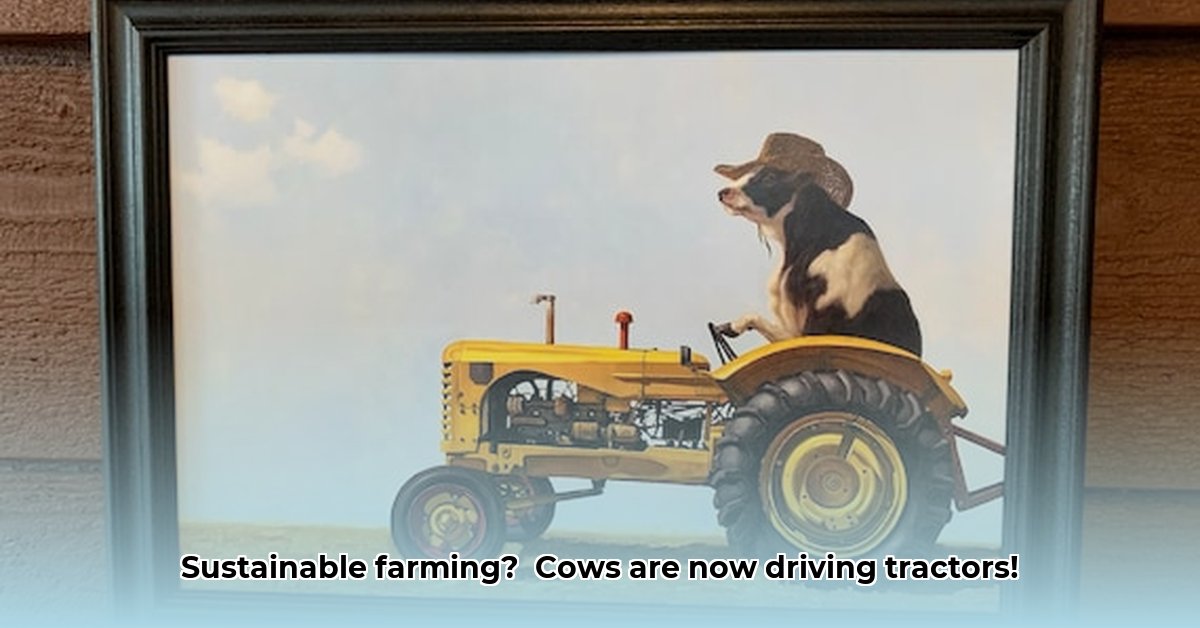
Cow Tractors: A Greener Future for Farming?
Forget the noisy, smelly diesel tractors of the past. Imagine a future where farms hum with the quiet power of methane, a gas often seen as a pollutant, repurposed to fuel the very machines that feed us. This isn't science fiction; methane-powered tractors are here, and they're changing the game. This article explores how these tractors work, highlighting their environmental and economic benefits, while acknowledging the challenges involved in their widespread adoption. We'll examine real-world examples and discuss the long-term outlook for this innovative technology. For more on smaller tractors, check out this helpful resource.
How Cow Tractors Work Their Magic: From Manure to Machine
The process begins with farm waste, primarily animal manure and other organic materials. This waste undergoes anaerobic digestion (a process that breaks down organic matter without oxygen), generating biogas. This biogas is then upgraded to biomethane, a cleaner-burning fuel ideal for powering tractors. This closed-loop system transforms waste into energy, reducing reliance on fossil fuels and lowering greenhouse gas emissions. Isn't that impressive?
The Big Advantages of Choosing a Cow Tractor
The environmental benefits are undeniable: significantly lower greenhouse gas emissions contribute to climate change mitigation efforts. But the advantages extend beyond environmental responsibility. Farmers could see substantial cost savings, potentially reaching up to 30% on operating expenses, depending on factors such as biomethane production costs and diesel prices. Furthermore, many methane tractors offer improved operator comfort and safety features compared to their diesel counterparts.
The Challenges on the Road to Cow Tractor Domination
While promising, several hurdles need to be overcome before widespread adoption. Establishing the necessary infrastructure for biomethane production and distribution demands significant investment in new facilities and transportation networks. The initial investment cost for a methane tractor can also be a barrier for some farmers. Additionally, finding trained mechanics who can efficiently service these new engines might initially present challenges.
Case Studies: Early Adopters Lead the Way
Despite these challenges, several forward-thinking farmers are already using methane-powered tractors, reporting excellent results and demonstrating the technology's viability. Their success stories highlight the efficiency and environmental benefits in real-world settings, paving the way for broader adoption.
The Future of Cow Tractors: A Vision of Sustainable Farming
The long-term potential is immense. Imagine a future where farms generate their own fuel, significantly reducing their environmental impact. This requires collaboration between governments, manufacturers, and farmers. Governments can incentivize adoption through supportive policies and financial incentives. Manufacturers need to continue improving the technology's affordability and accessibility. Farmers can embrace this innovation and integrate biomethane production into their operations. Continued research and development are essential for improving biomethane production efficiency and the reliability of methane tractors.
Actionable Steps for a Cow Tractor Future
To accelerate the transition to methane-powered tractors, a multi-pronged approach is necessary. This involves strategic actions by various stakeholders, focusing on both short-term and long-term goals:
Farmers: Research biomethane options, explore government subsidies and incentives, and assess tractor suitability for their operations. Long-term, optimize biomethane production and integrate it into farm management.
Manufacturers: Develop reliable maintenance networks, improve tractor design, and invest in research and development to enhance efficiency and reduce costs. Long-term strategies include expanding distribution networks and establishing partnerships with biogas producers.
Governments: Implement policies that support the transition to sustainable agriculture. This includes providing financial incentives, investing in supporting infrastructure, and establishing emission reduction targets. Long-term, continue investing in alternative fuel research and development, and promote sustainability initiatives.
Biogas Producers: Increase production capacity and efficiency, improve transportation networks, and build partnerships with farms to secure a reliable supply of biomethane. Long-term goals include developing scalable biodigestion technologies, enhancing biomethane quality, and expanding market reach.
Risk Assessment for Cow Tractor Adoption
Adopting methane tractors involves various risks that need careful consideration:
Biomethane Availability: The fluctuation in biomethane availability could impact operations, necessitating diversification of sources and improved storage and transportation.
Mechanical Reliability: The relative newness of the technology means that unforeseen mechanical issues could arise. Mitigation involves rigorous testing, proactive maintenance programs, and a skilled workforce.
Policy Uncertainty: Changes in government regulations or policies could influence the economic viability of methane tractors. Farmers should stay informed about relevant legislation.
Market Adoption Speed: The rate at which farmers adopt this technology will influence the overall success of the transition. Effective marketing and competitive pricing are vital.
Technician Availability: A shortage of trained technicians specialized in methane tractor maintenance and repair could hinder adoption. Investment in training and industry partnerships are necessary.
How to Calculate the Total Cost of Ownership for Methane Powered Tractors
Accurate cost estimation is crucial for responsible machinery management. This includes the initial investment, operating costs (fuel, maintenance, repairs, labor), depreciation, financing costs, taxes, and insurance. Comparing the total cost of ownership (TCO) of a methane-powered tractor to a comparable diesel tractor provides a clear financial picture. Environmental benefits, while not directly monetary, should also be factored into the long-term decision.
Conclusion: Embracing a Sustainable Future
The transition to sustainable farming requires a concerted effort. Methane-powered tractors represent a vital step toward a greener, more efficient agricultural sector. While challenges remain, the potential benefits – both environmental and economic – make this technology a significant development in the quest for sustainable food production. The future of farming is cleaner, more efficient, and powered by the resources we already have. Are you ready to join the revolution?